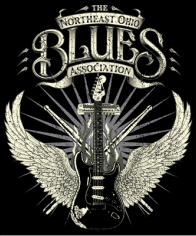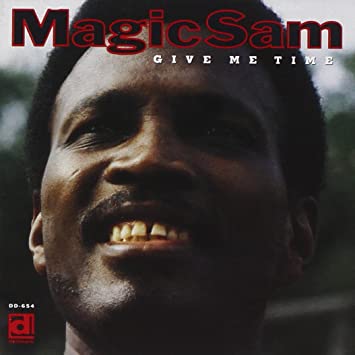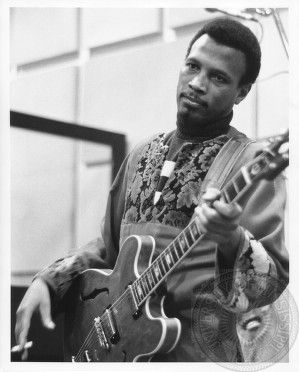When Magic Sam was felled by a heart attack in December of 1969 at 32 years old he left a void that was never filled. His reverb-drenched guitar and plaintive vocals were a cornerstone of the then-new Chicago West Side sound influencing nearly everyone who came after him. His truncated catalog revolves around the iconic WEST SIDE SOUL and its follow-up BLACK MAGIC but a few other gems have emerged over the years, usually live recordings. GIVE ME TIME is a nice twist on things, a collection of recordings done in Sam's house one afternoon. This is about as intimate a recording as it gets and it's Magic Sam.
The material is standard Magic Sam fare with a few Blues chestnuts thrown in for good measure. What sets these recordings apart is the home setting; Sam is alone with his guitar burning through his catalogue with the same graceful intensity as his studio recordings. Occasionally his children can be heard in the background and pianist Eddie Boyd who wrote "Five Long Years" makes a guest vocal appearance on "Come Into My Arms". Otherwise it's just Sam, his guitar, and his amp with the reverb cranked up as if he were recording or on a gig. He sounds no different here than he does on any of his studio recordings which is the album's charm.
"Give Me Some Time" is a reworking of "That's All I Need" opening the album the same way it's predecessor opens WEST SIDE SOUL. His voice is more relaxed than his studio and live recordings while maintaining the same intensity. The dry sound is an extra feature in some ways, more nuances in his vocal inflections are present than on his live and studio recordings where the mics are frequently overloading. "You Belong To Me" comes up next slightly shifting the focus to his guitar work. Chords stabs and low-string fills provide solid backing but when he solos we get to hear the little details that comprise his style, hearing him riding the guitar's volume knob between single-note lines and chords. The bulk of the album follows this formula of insight throughout his catalog with many of the songs being more familiar songs with the different titles. One the exceptions is B.B. King's "Sweet Little Angel", a Blues standard at the time by one the main guys who followed in T-Bone Walker's footsteps with the single-string style that was markedly different from what guys like Muddy and Wolf brought up to Chicago from Mississippi. What set the West Side sound apart from the South Side sound was the single-string call-and-response soling style that T-Bone Walker had started. Texas guitarists such as Albert Collins, Johnny Copeland, and Johnny 'Guitar' Watson furthered it locally but B.B. King was the first too take it to the masses with his early hits. This sound caught on with the then-younger generation of Chicago players and this is where they diverge from guitar styles such as the Muddy Waters/Jimmy Rogers combination. Ironically, it was these same Chicago players who would later have a huge influence on Texas players notably Austin pickers; Jimmie Vaughan, Stevie Ray Vaughan, Denny Freeman. To hear Magic Sam playing one of B.B.'s early and influential hits allows we the 21st Century listener a chance to revel in musical archeology and hear the lineage of Blues guitar passing down through the generations connecting the dots.
"That's All I Need" appears on the album as yet another exception to the rule. Where it previously opened the album reworked into a different title here the song itself is re-arranged. The minor key provides a platform for Sam to let loose with his vocal the way he normally would on stage or in the studio but with the intimacy of the dry home recordings. The most surprising inclusion is "Shake A Hand", a 1953 R&B hit originally recorded by Faye Adams and later recorded by a host of Rhythm & Blues artists. Once more we get to play musical archeologist and hear the influences of Gospel and Rhythm & Blues on his vocals a little more clearly.
For the uninitiated WEST SIDE SOUL is the place to start but for those who are already hip to his classic studio albums and some of the live recordings that have emerged here is a gem of raw beauty for your ears, Magic Sam sitting at home breezing through his songs. Music fans will enjoy the intimacy of it, musicians will be able to hear how he developed ideas into new ideas, and guitarists can study his playing closer than ever. Although this writer is loathe to recommend any streaming services due to their gouging of the artists whose work they profit off of an exception can be made in the case of many old Blues recordings since the royalties often went somewhere other than to the artists and their heirs anyhow. GIVE ME TIME is worth giving your time to hear a great artist in such a setting.
The material is standard Magic Sam fare with a few Blues chestnuts thrown in for good measure. What sets these recordings apart is the home setting; Sam is alone with his guitar burning through his catalogue with the same graceful intensity as his studio recordings. Occasionally his children can be heard in the background and pianist Eddie Boyd who wrote "Five Long Years" makes a guest vocal appearance on "Come Into My Arms". Otherwise it's just Sam, his guitar, and his amp with the reverb cranked up as if he were recording or on a gig. He sounds no different here than he does on any of his studio recordings which is the album's charm.
"Give Me Some Time" is a reworking of "That's All I Need" opening the album the same way it's predecessor opens WEST SIDE SOUL. His voice is more relaxed than his studio and live recordings while maintaining the same intensity. The dry sound is an extra feature in some ways, more nuances in his vocal inflections are present than on his live and studio recordings where the mics are frequently overloading. "You Belong To Me" comes up next slightly shifting the focus to his guitar work. Chords stabs and low-string fills provide solid backing but when he solos we get to hear the little details that comprise his style, hearing him riding the guitar's volume knob between single-note lines and chords. The bulk of the album follows this formula of insight throughout his catalog with many of the songs being more familiar songs with the different titles. One the exceptions is B.B. King's "Sweet Little Angel", a Blues standard at the time by one the main guys who followed in T-Bone Walker's footsteps with the single-string style that was markedly different from what guys like Muddy and Wolf brought up to Chicago from Mississippi. What set the West Side sound apart from the South Side sound was the single-string call-and-response soling style that T-Bone Walker had started. Texas guitarists such as Albert Collins, Johnny Copeland, and Johnny 'Guitar' Watson furthered it locally but B.B. King was the first too take it to the masses with his early hits. This sound caught on with the then-younger generation of Chicago players and this is where they diverge from guitar styles such as the Muddy Waters/Jimmy Rogers combination. Ironically, it was these same Chicago players who would later have a huge influence on Texas players notably Austin pickers; Jimmie Vaughan, Stevie Ray Vaughan, Denny Freeman. To hear Magic Sam playing one of B.B.'s early and influential hits allows we the 21st Century listener a chance to revel in musical archeology and hear the lineage of Blues guitar passing down through the generations connecting the dots.
"That's All I Need" appears on the album as yet another exception to the rule. Where it previously opened the album reworked into a different title here the song itself is re-arranged. The minor key provides a platform for Sam to let loose with his vocal the way he normally would on stage or in the studio but with the intimacy of the dry home recordings. The most surprising inclusion is "Shake A Hand", a 1953 R&B hit originally recorded by Faye Adams and later recorded by a host of Rhythm & Blues artists. Once more we get to play musical archeologist and hear the influences of Gospel and Rhythm & Blues on his vocals a little more clearly.
For the uninitiated WEST SIDE SOUL is the place to start but for those who are already hip to his classic studio albums and some of the live recordings that have emerged here is a gem of raw beauty for your ears, Magic Sam sitting at home breezing through his songs. Music fans will enjoy the intimacy of it, musicians will be able to hear how he developed ideas into new ideas, and guitarists can study his playing closer than ever. Although this writer is loathe to recommend any streaming services due to their gouging of the artists whose work they profit off of an exception can be made in the case of many old Blues recordings since the royalties often went somewhere other than to the artists and their heirs anyhow. GIVE ME TIME is worth giving your time to hear a great artist in such a setting.




 RSS Feed
RSS Feed